|
|
|
Sort Order |
|
|
|
Items / Page
|
|
|
|
|
|
|
| Srl | Item |
| 1 |
ID:
144340
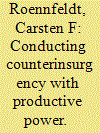

|
|
|
|
|
| Summary/Abstract |
Western governments tend to see power as synonymous with coercive force when they use their military forces in irregular armed conflicts abroad. Yet experiences from recent conflicts like Afghanistan and Iraq suggest that this understanding of power is unable to deliver the desired political ends. In an effort to better analyse and engage the political dynamics that dominate such conflicts, this article points to productive power. This theoretical perspective focuses on the micro-political dynamics that create legitimacy and mobilise people, which seminal counterinsurgency doctrines hold to be the goal.
|
|
|
|
|
|
|
|
|
|
|
|
|
|
|
|
| 2 |
ID:
144344


|
|
|
|
|
| Summary/Abstract |
While broad scholarly attention has been devoted to the securitization of migration in the ′EU’s relations with neighboring countries, less attention has been given to the ways in which the EU is partnering with third countries to fight other central ′‘unconventional security threats′’, such as terrorism and drug trafficking. This article traces the evolution of EU cooperation on these two issues with countries along the cocaine trafficking routes to Europe, i.e. Latin America and the Caribbean and West Africa. A mapping of EU initiatives and cooperation reveals that not only can a securitization of EU cooperation be observed in both regions, but various ′‘unconventional security threats′’, perceived in geopolitical terms, seem increasingly to serve as drivers for EU external action. The modalities of EU support – through international and regional organizations as well as third countries’ own counter-crime and counter-terrorism capabilities – suggest that the Union is fighting drug trafficking and terrorism ′‘by proxy′’. The article discusses whether the ′‘indirect′’ EU approach is a strategy of efficient engagement, or rather a way of avoiding commitment while portraying itself as a ′‘global crime fighter′’. Lastly, more analytical attention to third country interests, agency, and opposition is suggested in order for analyses to transcend the one-directional understanding of power seemingly underpinning the proxy concept.
|
|
|
|
|
|
|
|
|
|
|
|
|
|
|
|
| 3 |
ID:
144337
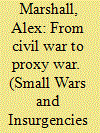

|
|
|
|
|
| Summary/Abstract |
The use of surrogate or ‘proxy’ actors within the context of ‘irregular’ or guerrilla conflict within or between states constitutes a phenomenon spanning nearly the whole of recorded human military history. Yet it is a phenomenon that has also acquired urgent contemporary relevance in the light of the general evolution of conflict in Ukraine and the current Middle East. This introduction to a special issue on the theme investigates some potentially important new avenues to studying the phenomenon in the light of these trends.
|
|
|
|
|
|
|
|
|
|
|
|
|
|
|
|
| 4 |
ID:
144342
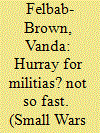

|
|
|
|
|
| Summary/Abstract |
Drawing on my fieldwork on militias in Afghanistan over the past decade, this article explores their security and political effects, with special focus on the Afghan Local Police. It analyzes changes in local security environments, effects on the Taliban insurgency and support for government, and the sustainability of and control over the militias. Key lessons include: Militias have a strong tendency to engage in abusive behavior – itself a new driver of conflict. Militias are least likely to abuse communities when they emerge spontaneously, face an abusive external force, and if major rifts and conflicts are absent from the community. Although militias might be local, their effects are not.
|
|
|
|
|
|
|
|
|
|
|
|
|
|
|
|
| 5 |
ID:
144343


|
|
|
|
|
| Summary/Abstract |
Russia’s recent operations in Ukraine, especially the integrated use of militias, gangsters, information operations, intelligence, and special forces, have created a concern in the West about a ‘new way of war’, sometimes described as ‘hybrid’. However, not only are many of the tactics used familiar from Western operations, they also have their roots in Soviet and pre-Soviet Russian practice. They are distinctive in terms of the degree to which they are willing to give primacy to ‘non-kinetic’ means, the scale of integration of non-state actors, and tight linkage between political and military command structures. However, this is all largely a question of degree rather than true qualitative novelty. Instead, what is new is the contemporary political, military, technological, and social context in which new wars are being fought.
|
|
|
|
|
|
|
|
|
|
|
|
|
|
|
|
| 6 |
ID:
144338
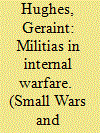

|
|
|
|
|
| Summary/Abstract |
Although it is a tenet of political science that the modern state possesses a ‘monopoly of violence’, governments have repeatedly used militias outside the formal chain of command of their armed forces when waging counterinsurgency (COIN), and in recent conflicts the USA, UK, and other Western powers have used irregular forces when fighting insurgencies in Iraq and Afghanistan. War-weariness and financial austerity is likely to encourage American and allied policymakers to rely on auxiliaries as proxies, despite the fact that historical experience demonstrates that the use of militias in COIN can have counterproductive consequences, not least for state stability. This article also concludes that the tendency of some Middle Eastern states (notably Iraq and Syria) to ‘coup-proof’ their militaries renders them even more dependent on militias in the face of a sustained internal revolt, as their regular armed forces collapse under the stress of combat. In this respect, there is a direct link between ‘coup-proofing’, dependence on irregular auxiliaries in civil war, and the erosion of the state’s integrity.
|
|
|
|
|
|
|
|
|
|
|
|
|
|
|
|
| 7 |
ID:
144345
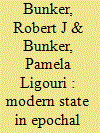

|
|
|
|
|
| Summary/Abstract |
This article is intended to serve as a ‘think piece’ which invites readers to view current perceived changes to the conduct of modern warfare in the broader historical light outlined by proponents of epochal change theory. Neo-medievalists have gone a step in this direction and posited that these changes represent the future of warfare and are evidence of a return, in a sense, to the primary tenets of political and social organization that existed in the period commonly referred to as the Middle Ages. The contention herein is that the answer gains more accuracy if one takes a much longer historical standpoint beginning with classical civilization and moving through the medieval period to our modern world. With regard to the present, this epochal warfare analysis projects that a shift from a Westphalian to post-Westphalian global system is underway. During this period of transition – as in the transition periods between epochs which have preceded it – the dominant state form undergoes a deinstitutionalization process, and war is less about traditional issues of state sovereignty, and instead increasingly over ‘what the new form of social and political organization will be’.
|
|
|
|
|
|
|
|
|
|
|
|
|
|
|
|
| 8 |
ID:
144341
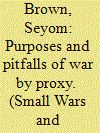

|
|
|
|
|
| Summary/Abstract |
The structure of the emergent global system – a volatile ‘polyarchy’ of state and non-state actors – accentuates temptations to employ military proxies, but also multiplies the risks when the priorities of the patron states and their proxies diverge. The motivations of proxies and the interests of the countries employing them are hardly ever sufficiently close, and the command-and-control arrangements sufficiently tight, to ensure that the battlefield behavior of proxies will not distort the military strategies and political objectives of their patrons. This article offers guidelines for reducing the risks and minimizing the consequences of such loss of control.
|
|
|
|
|
|
|
|
|
|
|
|
|
|
|
|
|
|
|
|
|